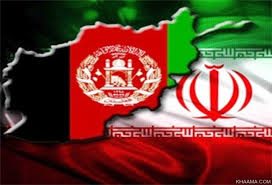VOA – Senior leaders of Afghanistan’s Taliban insurgency traveled to Iran Tuesday to “exchange views” on U.S.-brokered peace negotiations between warring Afghan parties.
Iranian Foreign Ministry spokesman Saeed Khatibzadeh said the insurgent team had been formally invited to Tehran for bilateral meetings “to review (the) Afghan peace process.”
Iran’s official media quoted Khatibzadeh as saying that the Taliban’s visit was “part of Tehran’s policy to reach out to key Afghan parties in the Afghan peace process.”
He said Taliban visitors held talks with senior government officials and they were also scheduled to meet Iranian Foreign Minister Javad Zarif.

Mullah Abdul Ghani Baradar, the Taliban’s deputy chief and head of the group’s political office in Doha, Qatar, was leading the delegation.
An official Taliban statement said its delegation in meetings with Iranian officials would discuss relations between the two neighboring countries and “the current political and security situation of Afghanistan and region.” It did not elaborate further.
Analysts say Iran’s move to host the Taliban could be an attempt to demonstrate to U.S. President Joe Biden’s administration that Tehran is keen to play its part in promoting Afghan peace to improve ties with Washington.
“(The) Taliban’s trip to Iran is more for Iran’s diplomatic benefits vis-a-vis the new U.S. administration,” said Torek Farhadi, a former Afghan advisor and political commentator.
“Iran shows it can also be helpful in the Afghan peace process…and show positive cooperation in the region. Iran wants to impress Washington,” Farhadi wrote on Twitter.
Intra-Afghan Talks
The Taliban is currently engaged in negotiations in Doha, Qatar, with a team of negotiators representing the Afghan government, where the two sides are tasked to agree on a political power-sharing deal that would permanently end deadly hostilities in Afghanistan.

Afghan Official: 600 Freed Taliban Prisoners Rearrested The development could pose a fresh challenge to US-backed Afghan peace efforts
The so-called intra-Afghan dialogue has stemmed from a February 2020 peace-building agreement former U.S. President Donald Trump’s administration struck with the Taliban to wind down nearly two decades of Afghan war.
The pact, which requires all U.S. and NATO troops to leave Afghanistan by May 2021, has reduced the number of U.S. soldiers to 2,500 from nearly 13,000 a year ago.
However, President Joe Biden’s new administration has said it intends to “review” the U.S.-Taliban deal.
U.S. National Security Advisor Jake Sullivan conveyed the decision to his Afghan counterpart on Friday.
A White House statement quoted Sullivan as saying his team wants to assess whether the Taliban was living up to its commitments to cut ties with terrorist groups, to reduce Afghan violence and to engage in “meaningful negotiations” with the government and other stakeholders” in the country.

Taliban See Ghani as ‘Obstacle’ to Afghan PeaceIn apparent rebuttal, Afghan president refuses to relinquish power, again vowing to transfer power to his ‘elected successor’
Afghan President Ashraf Ghani’s government, which was kept out of the U.S.-Taliban accord, has been critical of the document, saying it gave “too much” concessions to the insurgents and emboldened them to intensify battlefield violence instead of reducing it.
Ghani’s national security advisor, Hamadullah Mohib, on Sunday denounced the Taliban as a “terrorist group,” alleging the insurgents “do not want peace through talks and instead they are preparing to intensify battlefield attacks” in the upcoming summer fighting season.
Sullivan’s opening contact on Friday with Mohib by phone, however, is being hailed by leaders in Kabul and raising hopes Washington will press the Taliban to cease hostilities in favor of peace talks.
“A new chapter in our relationship with America has opened and it will continue…a quick review of the (U.S.) deal with the Taliban will be done… and then a fundamental consultation will be done with us,” Ghani told a cabinet meeting on Monday.
The Taliban has denied allegations it is behind the increase in violence and instead blames Kabul for lunching new operations against insurgent-held Afghan areas to try to subvert the U.S.-backed peace process.
Mohammad Naeem, the Doha-based spokesman for the Taliban, while speaking to VOA this week stressed the need for the Biden team to stick to the February 29 agreement. He said the document is kept to ending Afghanistan’s “foreign occupation” and years of bloodshed.
“It is in everyone’s interest for the agreement to be implemented as it is. We reiterate to fulfil our commitments outlined in the pact and demand the same from the other side,” Naeem said.
Al-Qaida Gaining Strength
But a new U.S. report says the al-Qaida terror network is “gaining strength” in Afghanistan while continuing to operate with the Taliban under the protection of the Afghan insurgent group.
The findings are part of a January 4 summary by the U.S. Department of Treasury about its programs to combat terrorist financing and activities.
It says al-Qaida “capitalizes on its relationship with the Taliban through its network of mentors and advisers who are embedded with the Taliban, providing advice, guidance, and financial support.”
The Treasury’s report notes “as of May 2020, the Taliban and al-Qaeda [sic] maintained a strong relationship and continued to meet regularly.”
The insurgent group has not immediately commented on the Treasury Department’s findings but it has rejected previous such allegations.
 Shabtabnews In this dark night, I have lost my way – Arise from a corner, oh you the star of guidance.
Shabtabnews In this dark night, I have lost my way – Arise from a corner, oh you the star of guidance.



